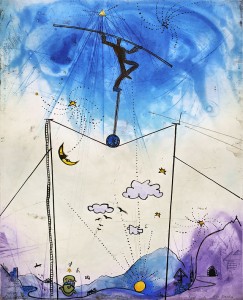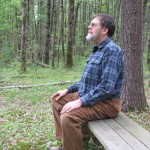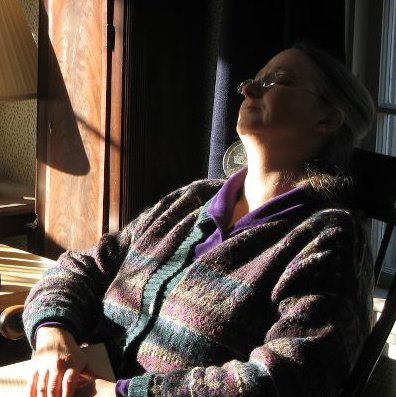There’s an experience known to many meditators, sometimes known as the Here I Am Wasn’t I? experience. The idea is this: you are si tting diligently, meditating away, and just for a moment, you experience a flash of that simple, actual conscious presence that is the goal of your meditation. You notice that you are simply and fully aware of the present moment, and then BAM! almost immediately, your awareness shifts to noticing how present and aware you are and just like that, you’re no longer meditating, you’re meta-tating, and you’ve lost exactly that present awareness you are now celebrating. “Here I Am Wasn’t I!”
tting diligently, meditating away, and just for a moment, you experience a flash of that simple, actual conscious presence that is the goal of your meditation. You notice that you are simply and fully aware of the present moment, and then BAM! almost immediately, your awareness shifts to noticing how present and aware you are and just like that, you’re no longer meditating, you’re meta-tating, and you’ve lost exactly that present awareness you are now celebrating. “Here I Am Wasn’t I!”
There is something very much akin to that in all spiritual work, and certainly in the kind of Quaker work called ministry. The whole point of ministry–perhaps of Quaker life in general–is to learn to be aware of and faithful to the promptings of Spirit in our lives. Meeting for worship is practice in listening for the small, still inward voice that sends us those leadings; clearness committees are a Quaker tool for helping one another to be clear on what those leadings may be asking of us over time; and committees of oversight of ministry, or elders, help us to follow the turns and twists of sustained leadings in service to a community. It’s all about staying open to that inward Guide: staying open, clear, and responsive. The point is faithfulness–in as simple, direct, and unembroidered a fashion as possible.
There is, as it happens, a Quaker analogy to the Here I am Wasn’t I experience, in which the budding Quaker or Quaker minister has worked diligently to hear and respond to the promptings of Spirit in as simple and direct a manner as possible. This could take the form of rising in a meeting for worship with vocal ministry for the group or it could take the form of organizing and emergency food drive. It doesn’t matter. The point is, our Quaker has stayed low and faithful, has felt the promptings of a spiritual leading, and has begun to act in obedience to that leading.
And of course, what happens next is that the Quaker in question notices how faithful they are being, how very obedient, how very responsive–and they have a Here I am Wasn’t I of noticing their own actions rather than the ongoing leading.
This kind of falling out of faithfulness can happen in the middle of vocal ministry or a hundred times a day while carrying out some wider, longer term leading. The point is, it disconnects us, however briefly, from the Spiritual Source that is driving the leading in the first place.
The human temptation is to tough it out, and to tune out the awareness that we’re not getting that same clear signal from Spirit that we began with. Or maybe we conclude that there’s really no difference between carrying a project forward on our own or under the guidance of Spirit. And of course, complicating matters is the fact that, with a long term ministry or a sustained leading (like counseling conscientious objectors, or teaching in a prison, or organizing a protest movement) there will be many moments where ordinary human conscientiousness is the correct tool for the immediate task. (I believe I became a teacher because of a leading. I do not believe that Spirit is going to tell me what grade to put onto a student’s essay, or help me write my final exam–though She may guide the ethics that shape my choices in those tasks.)
There are magickal equivalents to this, too. I suspect that most Pagans who have attempted to serve their communities in faithfulness to our spiritual promptings have noticed something similar happening there, as well. It begins well enough–but then we get lost. The kaballah of high magic teaches that those who attempt the Great Work of their consciousness ascending the Tree of Life are all too apt to make it about as far as Yesod, the sphere of illusions and the moon, and halt there, caught in an egotistical dream of ever-loftier spiritual accomplishment. Many a self-identified “adept” has a lifetime tenancy in Yesod.
Kidding ourselves–or distracting ourselves, or losing ourselves–is easy.
It gets complicated; that’s what I’m saying. Speaking as a Quaker, it’s all too easy to lose the signal in a burst of simple, human gladness when we do notice our own faithfulness–or, conversely, when we spend too long beating ourselves up for the moments when we lost our footing and strayed from following our Guide, or outran Her. Staying centered, staying low, staying simple turns out not to be so simple after all.
I often think of it as akin to walking a tightrope. If I keep my eyes in front of me and my awareness strictly on my path, I can just about keep my balance. But if I look from side to side, or if I look down–either to contemplate what I think of myself or what others might–I nearly always fall.

That is why Quakers have traditions of what they call “eldering” ministers: not as the 19th Century excesses would have it, by scolding them on every imagined slip or failing, but in the deeper, truer spiritual tradition of being skilled nurturers of faithfulness, whose ability to listen and to hold themselves in deep communion with God as they listen helps to root us in those depths, too. This is why there exist committees of oversight of ministry in many Quaker meetings, to assist what are called Public Friends–those whose work takes them up onto the high wire of faithfulness in front of large numbers of people, and has them run the risks of becoming famous in themselves. (One reason to celebrate the gift and not the individual Friend who brings it: adulation makes it harder to stay centered, makes it harder to stay faithful. Celebrity makes it easier to fall.)
And this is why liberal Quakers have begun to experiment with what they call Spiritual Accountability Groups–groups of peers, Quakers who are engaged in following leadings of their own, who can meet and share concerns, and hold one another in prayer as they do their work.
Perhaps most of all, these are groups that can spread a net beneath the high wire, to catch each other when we fall from our moments of faithfulness, and then gently, tenderly, knowing it will be our turn next (to be faithful or to fall) lift one another back up, to continue along the high wire.
Not here I am–here we are. Together: rising, falling, learning to find our way.















